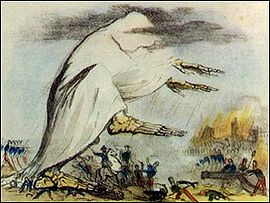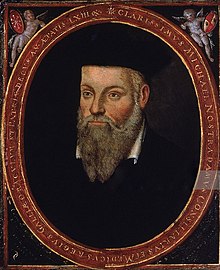The Miasma (artist's depicton)
Bubonic Plague (miasma theory of disease)
... Caused by a miasma. Miasma was considered to be a poisonous vapor or mist filled with particles from decomposed matter (miasmata) that caused illnesses. ... a noxious form of "bad air", also known as night air. The theory held that the origin of epidemics was due to a miasma emanating from rotting organic matter ... The miasma theory was accepted from ancient times in Europe and China. The theory was eventually given up by scientists and physicians after 1880, replaced by the germ theory of disease: specific germs, not miasma, caused specific diseases. ...Bubonic Plague (germ theory of disease)
An uncommon infectious disease of animals and humans caused by Yersinia pestis (Y. pestis) bacteria.From Wikipedia's Plague Doctor article about doctors who specialized in treating bubonic plague in earlier centuries in the West, in Europe in particular:
A famous plague doctor who gave medical advice about preventive measures which could be used against the plague was Nostradamus.[20][21] Nostradamus' advice was the removal of infected corpses, getting fresh air, drinking clean water, and drinking a juice preparation of rose hips.[22][23] In Traité des fardemens it shows in Part A Chapter VIII that Nostradamus also recommended not to bleed the patient.[23]Wow. I doubt a better single ingredient for fighting a serious bacterial infection could have been found in Europe during Nostradamus's era. Rose hips are very high in Vitamin C (they contain more C than citrus fruits), which is a powerful bacteria fighter. They also contain "vitamins A, B-3, D and E as well as bioflavonoids, citric acid, flavonoids, fructose, malic acid, tannins and zinc."
Moreover, Vitamin C has been shown in controlled studies to prevent pneumonia and in others to aid in the treatment of pneumonia. As the CDC notes, bubonic plague can progress into an infection of the lungs, causing pneumonic plague.
The most amazing aspect of Nostradamus's recommendation of rose hips is that Vitamin C wasn't identified until the 20th Century.
However, a little clarification would be in order at Wikipedia because a passage in their article on Nostradamus paints a different picture about his medical advice than the Wikipedia article on plague doctors:
Nostradamus was not only a diviner, but a professional healer. It is known that he wrote at least two books on medical science. One was an extremely free translation (or rather a paraphrase) of The Protreptic of Galen (Paraphrase de C. GALIEN, sus l'Exhortation de Menodote aux estudes des bonnes Artz, mesmement Medicine), and in his so-called Traité des fardemens (basically a medical cookbook containing, once again, materials borrowed mainly from others), he included a description of the methods he used to treat the plague, including bloodletting, none of which apparently worked.[40]So. Which one of the Wikipedia authors didn't read Traité des fardemens carefully? Or perhaps, from the #40 source note, it's that the author of the above passage blindly relied on a writer, Peter Lemesurier, who from his 2010 book quite clearly judged Nostradamus to be a fraud in all matters.
However, Lemesurier was technically correct in claiming that Nostradamus wasn't a doctor. He did not have a medical degree but he certainly studied medicine, and in a university setting for a time, and most importantly he was both an herbalist and an apothecary. From another section of Wikipedia's article on Nostradamus:
Student Years
At the age of 14[6] Nostradamus entered the University of Avignon to study for his baccalaureate. After little more than a year (when he would have studied the regular trivium of grammar, rhetoric and logic rather than the later quadrivium of geometry, arithmetic, music, and astronomy/astrology), he was forced to leave Avignon when the university closed its doors during an outbreak of the plague.
After leaving Avignon, Nostradamus, by his own account, traveled the countryside for eight years from 1521 researching herbal remedies.
In 1529, after some years as an apothecary, he entered the University of Montpellier to study for a doctorate in medicine. He was expelled shortly afterwards by the student procurator, Guillaume Rondelet, when it was discovered that he had been an apothecary, a "manual trade" expressly banned by the university statutes, and had been slandering doctors.[15] The expulsion document, BIU Montpellier, Register S 2 folio 87, still exists in the faculty library.[16]
However, some of his publishers and correspondents would later call him "Doctor". After his expulsion, Nostradamus continued working, presumably still as an apothecary, and became famous for creating a "rose pill" that purportedly protected against the plague.[17]The rose pill was made from rose hips. From the History Channel's article about Nostradamus:
Over the next several years, Nostradamus traveled throughout France and Italy, treating victims of the plague. There was no known remedy at the time; most doctors relied on potions made of mercury, the practice of bloodletting, and dressing patients in garlic soaked robes.
Nostradamus had developed some very progressive methods for dealing with the plague. He didn’t bleed his patients, instead practicing effective hygiene and encouraging the removal of the infected corpses from city streets.
He became known for creating a “rose pill,” an herbal lozenge made of rosehips (rich in Vitamin C) that provided some relief for patients with mild cases of the plague.
His cure rate was impressive, though much can be attributed to keeping his patients clean, administering low-fat diets, and providing plenty of fresh air.The History Channel doesn't give enough credit to rose hips and doesn't mention that Nostradamus also saw to it that his patients got clean drinking water; those two factors, more than fresh air or keeping the patient clean, would have greatly improved chances for recovery from bubonic plague. And would have prevented mild cases from turning severe.
There is an additional angle. Vitamin C is a detoxifier and poison antidote although that's getting into administering megadoses of the vitamin. But even at lower doses and if consumed on a regular basis a rose hip preparation, whether in juice or lozenge form, would have been some protection from harmful bacteria in drinking water. That would have made the difference between life and death for many seriously ill patients. In Europe's cities the drinking water was so polluted it's amazing the people there lived past 20 unless they drank water in the form of beer or other alcoholic beverage.
As to Nostradamus's purported slandering of doctors -- if he was criticizing the general run of 'plague doctors' it wasn't slander but the bald truth. Many who were called plague doctors had no medical training whatsoever. Yet even for experienced caregivers with medical degrees their success rate at curing bubonic and pneumonic plague hovered around zero. Any recovery they oversaw was due to a patient's unusually strong immune system.
The plague doctors simply didn't know what they were doing. They had no knowledge of the disease they were up against beyond its overt symptoms. Nostradamus was the towering exception. He did develop some knowledge, and it put him centuries ahead of his time in treating a very lethal bacterial infection.
********



No comments:
Post a Comment